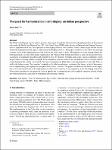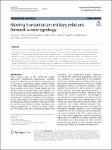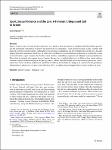Search
Author
- Cooper, Davina (2)
- Eidenmüller, Horst (2)
- Emad, Gholam Reza (2)
- Fiorato, Sidia (2)
- next >
Subject
- Vulnerability (3)
- CJEU (2)
- COVID-19 pandemic (2)
- Criminal Law (2)
- next >
Date issued
Has File(s)
Search Results
Past and ongoing research in the design, development, and implementation of fully autonomous and unmanned ships has revealed operational, environmental, and financial benefits for the maritime industry. However, with the benefits of being highly intuitive and intelligent systems, there are risks of mistakes and failures caused by their operators i.e. the unavoidable human element. With predictions of both seafarers and non-seafarers to be involved in the critical operations of autonomous vessels, it was imperative to identify key maritime stakeholders and conduct research which would investigate their beliefs and perceptions on the training requirements of the future shore-based operators. |
The World Anti-Doping Agency aims to promote clean sport through the introduction and implementation of harmonised rules under the World Anti-Doping Code, 2021 (the Code). Since WADA relies heavily on National Anti-Doping Organisations to implement the Code, the experience of anti-doping differs across countries. Some scholars argue that the current framework disproportionately impacts athletes from developing countries. This paper contributes to this debate by analysing systemic issues in the implementation of the Code in one such country—India. The legitimacy of anti-doping in India has been questioned as a result of the recent suspension of the National Dope-Testing Laboratory, a series of false positive tests, accusations of significant procedural and substantive errors by domes... |
The COVID-19 crisis illustrates the fragility of supply chains. Countries with excellent health systems struggled to ensure essential supplies of food, medicines, and personal protective equipment which were vital to a fast and effective response. Using geo-legality, which maps the constitutive relations between law and space, we argue that the failure of supply chains in many western countries during the crisis reveals a fundamental tension between their role as facilitators of care and caring, and the logistic logics by which they operate. While supply chains link the intimate, domestic concerns of providing medical care with the globalised geographical concerns of moving goods across different jurisdictions at the right time, their contemporary organisation and regulation does no... |
For many years, paper was the main format for the registration of companies. The Digitalisation Directive, adopted in 2019, obliged European Union (EU) Member States to provide founders with the option to form private companies digitally. Although for Lithuania, where online formation of legal entities had already existed even before 2019, these regulatory developments did not bring about radical change, they forced the national legislator to introduce the required amendments. This article aims at studying the provisions of the Digitalisation Directive and the results of its implementation in Lithuania to suggest possible improvements in the online registration of companies. |
The article explores the long lost synthesis between apophatic and cataphatic theological strategies and early legal systematizations which shaped the Christian, Jewish and Islamic legal collections in the twelfth century. It argues that the theological possibilities to achieve Divine knowledge have reached out to all normative forms of human existence including law. It focuses specifically on a Christian context where imagining the law involves complex scales of cataphasis and apophasis and parallels other normative forms such as ritual and ascetic practices. The text only hints that parallel trends appear via very different routes but in a very similar ways in the Jewish and the Islamic legal projects and proposes that a comparative interreligious study of the twelfth century lega... |
This article presents a new typology for humanitarian-military relations (HMR). This typology can serve as an analytical framework for assessing, during humanitarian emergencies, how civilian responders can and should engage with armed actors. The typology considers two factors: (1) the nature of crisis-affected population’s perceptions of an armed actor, and (2) the extent of alignment of civilian responders’ and armed actors’ interests and objectives. This typology is empirically rooted in an in-depth analysis of HMR across four humanitarian response contexts: (1) the Kivu Ebola Epidemic in the Democratic Republic of the Congo, (2) the Rukban forced displacement crisis along the Jordan-Syria border, (3) the Taal volcano eruption in the Philippines, and (4) the COVID-19 pandemic in... |
State derecognition, defined as the withdrawal of recognition from a putative state, has been more impactful as a diplomatic subculture in the last decades than is often assumed. Recent practice suggests that when states engage in derecognition, they do not mechanically assess whether a state no longer fulfils the traditional criteria for statehood, but rather employ derecognition as a tool of foreign policy, tailored to enhance their own economic and geopolitical interests. The bargaining dynamics of derecognition and “rental recognition” policies adopted by a range of smaller states create a precarious hostage-like situation for the targeted entities who helplessly watch their international status being traded in a recognition market. |
The article elaborates on the EU Green Bond Standard, a cornerstone of the Proposal for a Regulation on European green bonds that was put forward by the European Commission in July 2021. Within the analysis, three research questions are posed. First, the article deals with the question of whether the EU Green Bond Standard is really needed; particularly, whether there is a need for EU regulatory intervention on the EU green bond market. Second, it examines the method of regulation which was adopted for the EU Green Bond Standard. Specifically, does this standard differ and offer any added value compared to private standards for the issuance of green bonds? Finally, the article discusses the impact of the EU Green Bond Standard on the EU green bond market. |
The Inter-American Court of Human Rights’ judgment in Manuela and Others v El Salvador represents a missed opportunity for advancing abortion access and sexual and reproductive health and rights in international human rights law (IHRL). Even though this case is representative of the multiple human right violations arising from El Salvador’s complete criminalisation of abortion and active prosecution of those suspected of having had the procedure, the Court shied away from engaging in a critique of El Salvador’s abortion legislation. Instead, it focused on issues relating to pre-trial detention, due process, and medical confidentiality. |
Sport is a microcosm of society. In this connection, in as much as there are reasons to celebrate individual athletic prowess and the undeniable contribution of sport to the maturation of communities, sport, like the broader society, contends with many ills, not least sexual violence. Although various sporting organizations and governments have, in the last 2 decades, adopted legislative instruments and Codes of Ethics and established various institutional mechanisms to combat the scourge of sexual violence, sport remains a hot bed for sexual violence, intimidation, reprisals and indignity in many jurisdictions. This article accordingly interrogates, from a Feminist Perspective, recently decided cases to illustrate how sexual violence committed against women and girls in the sportin... |










